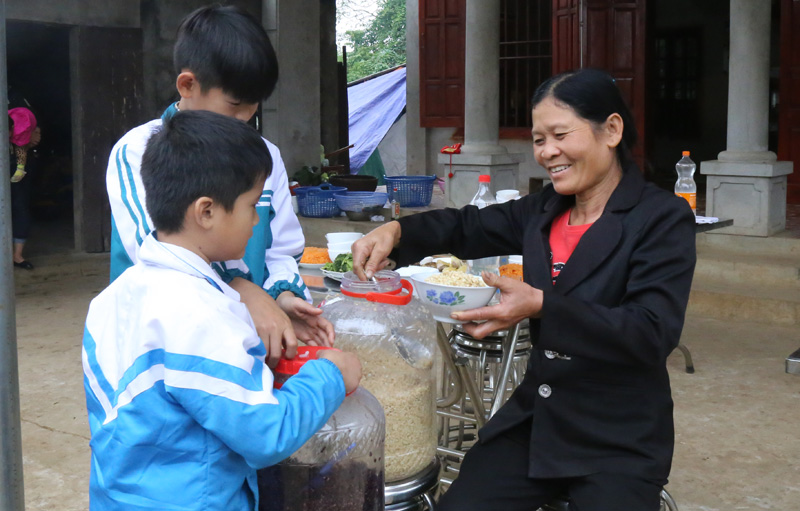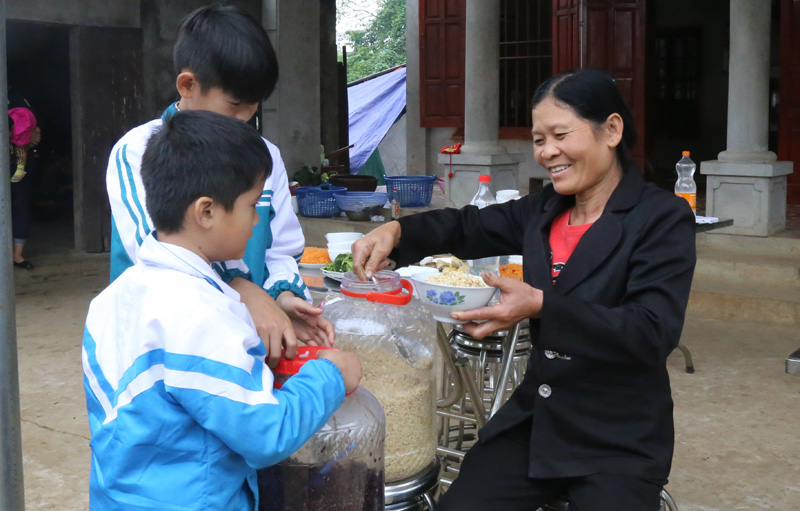
(HBO) – On the 26th day of the 10th lunar month every year, people in Muong Ram village, Lac Thinh commune in Yen Thuy district put aside daily work to welcome the "De” rice (fermented rice) festival.

Members in the family of Mrs. Bui Thi Khoa in Dinh village, Lac Thinh
commune (Yen Thuy district) are preparing "De” rice to treat guests on the
occasion of the festival.
The festival is originated from a story, which
has been passed through generations in the Muong Ram people community. The
story tells about a general who leaded troops to fight enemy from the north. In
a battle, he lost and wounded. He and his troops accidentally ran to Yen Thuy
and asked a Muong ethnic family to stay there. It was early morning at that
time, the poor family had nothing to eat. They boiled papaya, bitter melons and
bamboo shoots for him. Then they also offered him some "De” rice which the host
prepared to make wine for the Tet festival. The rice in a process of
fermentation with both spicy and sweet tastes became a delicious food for the
soldiers who were very hungry.
After talking with locals on the morning, the
general recognised that the residents usually suffered from hunger due to
drought. The general was touched by the owner’s goodness, he helped the people
pray for rain.
Commemorating the merits of the general, people
in Muong Ram hold the "De” rice festival every year. In the offering tray,
there are always De rice in addition to foods the general ate. Since then,
people think that rain in the festival is a signal for bumper crop in the New
Year.
Today, although the life is better, Lac Thinh
people still respect the "De” rice festival. We had a chance to join communal
officials in the festival.
At 10 am, roads to Dinh village - the source of
the festival was full with local residents. As a rule, Muong Ram people who
work in every corner across the country returned to their home to enjoy nice
time along with their relatives during the festival.
In her new house, Mrs. Bui Thi Khoa was filling
bowls with "De” rice and talking to guests. She and her family members were
very happy because her family welcomed many guests from afar along with her
relatives in this year’s De festival.
"On this day, every household in the village
slaughter pig and cook sticky rice to treat their guests who are not invited
previously,” she said.
To prepare for the festival, from the 20th day
the 10th lunar month, local households prepare to make fermented rice. Rice for
making the "De” rice is the white sticky rice and the violet glutinous rice
planted by their families. The rice will be fermented for five days. On the
26th day of the 10th lunar month, the rice will be put on a tray for worshiping
ancestors.
After offering their ancestors, families make
dishes with available materials raised, grown or collected from forest
themselves to treat guests.
The "De” rice festival becomes a unique culture
identity of Muong Ram people in Hoa Binh. It offers an opportunity to relatives
to gather together, thus tightening solidarity among the community./.
With an increasingly vibrant and widespread emulation movement aimed at building cultured residential areas and cultured families, Yen Thuy District has been making steady progress toward improving both the material and spiritual well-being of its people, while fostering a civilized, prosperous, beautiful, and progressive community.
Once lacking recreational spaces and community facilities, Residential Group 2 in Quynh Lam Ward (Hoa Binh City) has recently received attention for the construction of a new, spacious, and fully equipped cultural house. The project followed the model of state support combined with public contributions in both labor and funding.
The "All people unite to build cultural life" movement, which has been effectively integrated with Kim Boi district’s socio-economic development goals, is fostering a lively spirit of emulation across local residential areas, hamlets, villages, public agencies, and enterprises. In addition, through the initiative, traditional cultural values are being preserved and promoted, while community solidarity and mutual support in poverty reduction and economic development are being strengthened.
A working delegation of the Hoa Binh provincial People’s Committee led by its Permanent Vice Chairman Nguyen Van Toan on June 11 inspected the progress of a project to build the Mo Muong Cultural Heritage Conservation Space linked to tourism services in Hop Phong commune, Cao Phong district.
Born and growing in the heroic land of Muong Dong, Dinh Thi Kieu Dung, a resident in Bo town of Kim Boi district, in her childhood was nurtured by the sweet lullabies of her grandmother and mother. These melodies deeply imprinted on her soul, becoming an inseparable part of her love for her ethnic group's culture. For over 20 years, this love for her hometown has driven Dung to research, collect, and pass down the cultural values of the Muong people to future generations.
In the final days of May, the Ethnic Art Troupe of Hoa Binh Province organized performances to serve the people in remote, mountainous, and particularly disadvantaged areas within the province. These were not just ordinary artistic shows, but they were the meaningful journeys aimed at spreading cultural values, enhancing the spiritual life of the people and contributing to the preservation of ethnic minority cultural identities.



